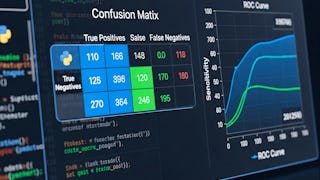- Browse
- Big Data
Results for "big data"
 Status: NewNewStatus: Free TrialFree Trial
Status: NewNewStatus: Free TrialFree TrialSkills you'll gain: Embeddings, Natural Language Processing, Keras (Neural Network Library), Generative AI, Convolutional Neural Networks, Transfer Learning, Recurrent Neural Networks (RNNs), Model Evaluation, Image Analysis, Artificial Neural Networks, Text Mining, Computer Vision, Data Preprocessing, Tensorflow, Deep Learning, Model Deployment, Applied Machine Learning, Google Cloud Platform, Jupyter, Matplotlib
Beginner · Specialization · 1 - 3 Months
 Status: NewNewStatus: PreviewPreview
Status: NewNewStatus: PreviewPreviewSkills you'll gain: Model Evaluation, Exploratory Data Analysis, Data Preprocessing, Predictive Modeling, Decision Tree Learning, Credit Risk, Random Forest Algorithm, Feature Engineering, Financial Modeling, Logistic Regression, Data Analysis, Statistical Machine Learning, Applied Machine Learning, Scikit Learn (Machine Learning Library), Pandas (Python Package), Machine Learning Methods, Classification Algorithms
Mixed · Course · 1 - 4 Weeks
 I
IIllinois Tech
Skills you'll gain: Microsoft Excel, Spreadsheet Software, Excel Formulas, Dashboard, Data Entry, Productivity Software, Business Reporting, Data Cleansing, Data Visualization, Data Management, Analytics, Data Validation
Build toward a degree
4.5·Rating, 4.5 out of 5 stars31 reviewsBeginner · Course · 1 - 4 Weeks
 Status: FreeFree
Status: FreeFreeSkills you'll gain: JSON, Restful API, HTML and CSS, Web Design, Cloud API, Hypertext Markup Language (HTML), Web Development, Cascading Style Sheets (CSS), Web Applications, Responsive Web Design, Real Time Data, Javascript
4.2·Rating, 4.2 out of 5 stars38 reviewsIntermediate · Guided Project · Less Than 2 Hours
 Status: Free TrialFree TrialI
Status: Free TrialFree TrialIImperial College London
Skills you'll gain: Health Assessment, Public Health, Program Evaluation, Epidemiology, Health Policy, Health Promotion, Intelligence Collection and Analysis, Continuous Quality Improvement (CQI), Data Collection, Report Writing
4.6·Rating, 4.6 out of 5 stars74 reviewsBeginner · Course · 1 - 4 Weeks
 Status: PreviewPreview
Status: PreviewPreviewSkills you'll gain: Prompt Engineering, Applicant Tracking Systems, Responsible AI, Google Gemini, Talent Acquisition, Recruitment, HR Tech, Generative AI, Microsoft Power Automate/Flow, ChatGPT, Business Process Automation, Automation
4.8·Rating, 4.8 out of 5 stars6 reviewsIntermediate · Course · 1 - 4 Weeks
 Status: Free TrialFree TrialA
Status: Free TrialFree TrialAArizona State University
Skills you'll gain: Usability, Usability Testing, Problem Solving, Human Factors, User Experience Design, Human Centered Design, Critical Thinking and Problem Solving, Human Factors Engineering, Creativity, User Research, Decision Making, Human Computer Interaction, Human Learning, User Interface (UI), Data Collection, Human Machine Interfaces, Research Design, Computer Displays, Accident Prevention, Control Systems
4.8·Rating, 4.8 out of 5 stars50 reviewsIntermediate · Specialization · 3 - 6 Months
 Status: Free TrialFree TrialK
Status: Free TrialFree TrialKKodeKloud
Skills you'll gain: Package and Software Management, Linux Administration, Linux, Application Development, Linux Commands, Devops Tools, Operating System Administration, General Networking, Web Applications, Network Switches, Cloud Applications, Java, DevOps, Computer Programming, Node.JS, Software Installation
4.7·Rating, 4.7 out of 5 stars108 reviewsBeginner · Course · 1 - 4 Weeks
 Status: Free TrialFree TrialI
Status: Free TrialFree TrialIInfosec
Skills you'll gain: Incident Response, Computer Security Incident Management, Threat Management, Cyber Operations, Incident Management, Cybersecurity, Disaster Recovery, Cyber Threat Hunting, Intrusion Detection and Prevention, Security Management, Cyber Threat Intelligence, Digital Forensics, Threat Detection, Cyber Attacks, Cyber Security Assessment, Event Monitoring, Network Security, Data Security, Business Continuity, Analysis
4.7·Rating, 4.7 out of 5 stars268 reviewsBeginner · Specialization · 3 - 6 Months
 Status: Free TrialFree TrialU
Status: Free TrialFree TrialUUniversidad Nacional Autónoma de México
Skills you'll gain: Program Evaluation, Education and Training, Teaching, Instructional and Curriculum Design, Survey Creation, Data Analysis Software, Education Software and Technology, Qualitative Research, Statistical Analysis
4.8·Rating, 4.8 out of 5 stars143 reviewsIntermediate · Course · 1 - 4 Weeks
 Status: Free TrialFree Trial
Status: Free TrialFree TrialSkills you'll gain: Competitive Analysis, Business Development, Data-Driven Decision-Making, Generative AI, Market Opportunities, Market Analysis, Market Research, Trend Analysis, Business Intelligence, Business Strategy, Sustainable Business, Forecasting, Strategic Planning
Beginner · Course · 1 - 4 Weeks
 Status: Free TrialFree Trial
Status: Free TrialFree TrialSkills you'll gain: Computer Vision, Dashboard, IBM Cloud, Responsible AI, Artificial Intelligence, Data Ethics, Image Analysis, ChatGPT, Cloud Computing, Pandas (Python Package), Business Workflow Analysis, Data Manipulation, No-Code Development, Context Management, Artificial Neural Networks, Cloud Applications, AI Workflows, Cloud Deployment, Application Programming Interface (API), WordPress
4.7·Rating, 4.7 out of 5 stars448 reviewsBeginner · Professional Certificate · 3 - 6 Months
In summary, here are 10 of our most popular big data courses
- Keras Deep Learning Projects with TensorFlow: EDUCBA
- Credit Default Prediction with Python: Apply & Analyze: EDUCBA
- Mastering Excel Essentials to Enhance Business Value: Illinois Tech
- Build a Website using an API with HTML, JavaScript, and JSON: Coursera
- Foundations of Public Health Practice: The Public Health Toolkit : Imperial College London
- GenAI for Talent Acquisition: Smarter Candidate Screening: Coursera
- Human Factors & Usability Engineering: Designing for Humans: Arizona State University
- DevOps Prerequisite Course: KodeKloud
- Cyber Incident Response: Infosec
- Evaluación del y para el aprendizaje: enfoque cuantitativo: Universidad Nacional Autónoma de México










